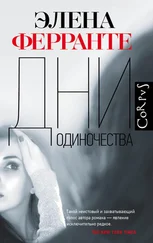We confronted the question of other possible meetings and I immediately assumed a cautious tone. I said that I had to study, that skipping school had been a mistake, that if I was really going to see my aunt, I would do it on Sundays. Naturally, I never mentioned how Vittoria had talked to me about her love for Enzo. I intuited that if I had reported just one of those words they would have gotten angry.
A less anxious period began. At school things had improved in the last part of the year, I was promoted with a respectable average, and vacation began. In accordance with an old custom, we spent two weeks in July at the beach in Calabria with Mariano, Costanza, Angela, and Ida. And we also spent the first ten days of August with them at Villetta Barrea, in Abruzzo. The time flew by, and the new school year began. I was starting the first year of high school, not in the high school where my father taught or the one where my mother taught but at a school on the Vomero. Meanwhile my relationship with Vittoria didn’t fade but, rather, solidified. Already before the summer vacation, I’d begun to telephone her: I felt the need for her rough tone, I liked being treated as if I were her age. During our stay at the beach and in the mountains, I’d start talking about her as soon as Angela and Ida boasted about their rich grandparents and other wealthy relatives. And in September, with permission from my mother and father, I saw her a couple of times. Then, during the fall, since there were no particular tensions at my house, our meetings became a routine.
At first, I thought that thanks to me there might be a rapprochement between the siblings, and I went so far as to convince myself that my task was to bring about a reconciliation. But that didn’t happen. Instead, a rite of extreme coldness was established. My mother drove me to her sister-in-law’s house, but she brought something to read or to correct and waited in the car; or Vittoria came to get me at San Giacomo dei Capri, but she didn’t knock at our door by surprise as she’d done the first time; I met her in the street. My aunt never said: ask your mother if she wants to come up, I’ll make her a coffee. My father was careful not to say: have her come up, sit a while, we’ll have a little chat and then you’ll go. Their mutual hatred remained intact, and I soon gave up any attempt at mediation. I began instead to say to myself explicitly that that hatred was an advantage for me: if my father and his sister made peace, my encounters with Vittoria wouldn’t be exclusive, I might be downgraded to niece, and certainly I would lose the role of friend, confidante, accomplice. Sometimes I felt that if they stopped hating each other I would do something to make them start again.
7.
Once, without any warning, my aunt brought me to meet her and my father’s other siblings. We went to see Uncle Nicola, who worked on the railroad. Vittoria called him the eldest brother, as if my father, who was the firstborn, had never existed. We went to see Aunt Anna and Aunt Rosetta, housewives. Aunt Anna was married to a printer at the newspaper Il Mattino , Aunt Rosetta to a postal worker. It was a sort of exploration of blood relations, and Vittoria herself, in dialect, said of that journey: we’re going to meet your blood. We traveled through Naples in the green Fiat 500, going first to Cavone, where Aunt Anna lived, then to the Campi Flegrei, where Uncle Nicola lived, then to Pozzuoli, to Aunt Rosetta.
I realized that I barely remembered these relatives, maybe I had never actually known their names. I tried to hide it, but Vittoria noticed and immediately started saying mean things about my father, who had deprived me of the affection of people certainly without education, not smooth talkers, but warm-hearted. How important to her the heart was, coinciding in her gestures with her large breasts, which she struck with her broad hand and gnarled fingers. It was in those situations that she began to suggest to me: look at what we’re like and what your father and mother are like, then tell me. She insisted forcefully on that matter of looking. She said I had blinders like a horse, I looked but didn’t see the things that could disturb me. Look, look, look, she hammered into me.
In fact, I let nothing escape me. Those relatives, their children a little older than me or my age, were a pleasant novelty. Vittoria flung me into their houses without warning, and yet aunts and uncles, nieces and nephews welcomed me with great familiarity, as if they knew me well and had been simply waiting, over the years, for my visit. The apartments were small, drab, furnished with objects that I had been brought up to judge crude if not vulgar. No books, only at Aunt Anna’s house did I see some mysteries. They all spoke to me in a cordial dialect mixed with Italian, and I made an effort to do the same, or at least I made room in my hypercorrect Italian for some Neapolitan cadences. No one mentioned my father, no one asked how he was, no one charged me with saying hello to him, evident signs of hostility, but they tried in every way to make me understand that they weren’t angry with me. They called me Giannina, as Vittoria did and as my parents never had. I loved them all, I had never felt so open to affection. And I was so relaxed and funny that I began to think that that name assigned to me by Vittoria—Giannina—had miraculously brought forth from my same body another person, more pleasant or anyway different from the Giovanna by which I was known to my parents, to Angela, to Ida, to my classmates. They were happy occasions for me, and I think also for Vittoria, who instead of displaying the aggressive sides of her character was, during those visits, good-natured. Above all, I noticed that brother, sisters, sister- and brothers-in-law, nieces and nephews treated her tenderly, as one does an unfortunate person one loves dearly. Uncle Nicola especially was kind to her, he remembered that she liked strawberry gelato and as soon as he discovered that I liked it, too, he sent one of his children to buy some for everyone. When we left, he kissed me on the forehead and said:
“Luckily you’ve got nothing of your father in you.”
I was learning to hide from my parents what was happening to me. Or, rather, I perfected my method of lying by telling the truth. Naturally I didn’t do it lightly, it pained me. When I was at home and heard them moving about the rooms with the familiar footsteps that I loved, when we had breakfast together, had lunch, dinner, my love for them prevailed, I was always on the point of crying: Papa, Mamma, you’re right, Vittoria hates you, she’s vengeful, she wants to take me away from you to hurt you, hold on to me, forbid me to see her. But as soon as they started with their hypercorrect sentences, with those controlled tones of theirs, as if truly every word concealed others, truer, from which they excluded me, I secretly called Vittoria, I made dates.
By now only my mother questioned me politely about what happened.
“Where did you go?”
“To Uncle Nicola’s house, he says hello to you.”
“How did he seem to you?”
“A little dumb.”
“Don’t talk like that about your uncle.”
“He’s always laughing for no reason.”
“Yes, I remember he does that.”
“He’s not at all like Papa, not even a little.”
“It’s true.”
I was soon involved in another important visit. My aunt took me—as usual without warning—to see Margherita, who lived not far from her house. That whole area revived the agonies of childhood. The peeling walls upset me, the abandoned-looking low buildings, the gray-blue or yellowish colors, the fierce dogs that would chase the 500 for a stretch, barking, the smell of gas. Vittoria parked, she headed toward a wide courtyard surrounded by pale-blue buildings, went through a door, and only when she set off up the stairs turned to tell me: this is where Enzo’s wife and children live.
Читать дальше
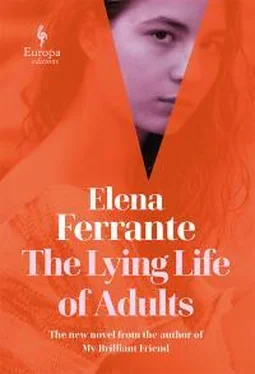
![Элена Ферранте - История о пропавшем ребенке [litres]](/books/32091/elena-ferrante-istoriya-o-propavshem-rebenke-litres-thumb.webp)
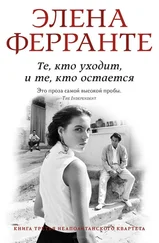
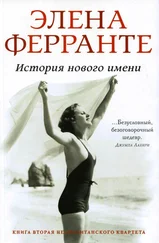
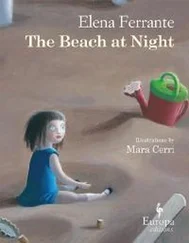
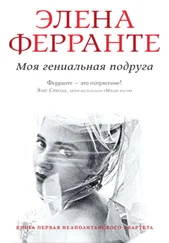
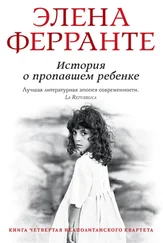
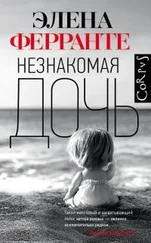
![Элена Ферранте - Дни одиночества [litres]](/books/404671/elena-ferrante-dni-odinochestva-litres-thumb.webp)


